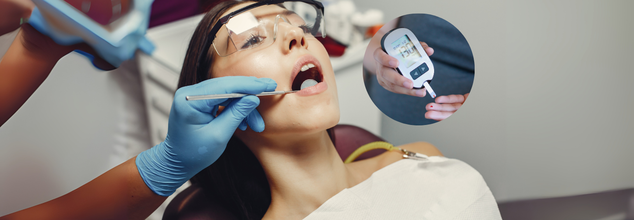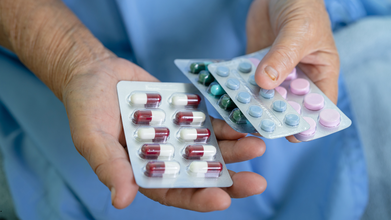- Health Conditions A-Z
- Health & Wellness
- Nutrition
- Fitness
- Health News
- Ayurveda
- Videos
- Medicine A-Z
- Parenting
One Crucial Habit Every Diabetic Is Forgetting – And It Starts With Your Toothbrush

When it comes to managing diabetes, the conversation typically centers on blood sugar, insulin, and diet. However, one critical piece of the equation that usually goes unmentioned: oral health. For those who have diabetes, poor oral care can result in a chain of health issues, not only affecting teeth and gums, but possibly overall body health as well.
For millions living with diabetes, maintaining a healthy mouth is not just about preventing cavities or bad breath—it’s about safeguarding against serious complications that can affect the entire body. As diabetes rates soar globally, understanding the unique oral health challenges faced by diabetics is more important than ever.
Your mouth can reveal a lot about your health. Swollen, bleeding, or receding gums; loose teeth or missing teeth; and bad breath that won't go away are all symptoms of gum disease—something diabetes patients are particularly susceptible to. Gingivitis (mild gum disease) and periodontitis (advanced gum disease) both begin with plaque, a sticky layer of bacteria that forms on teeth. Although the bacteria themselves are not specific to diabetics, the body's inflammatory reaction to the bacteria tends to be increased in diabetics, particularly with poor blood sugar control. That enhanced inflammation may result in the loss of tissue under the teeth, ultimately leading to a loss of the teeth if not treated.
The primary distinction for individuals who have diabetes is not the bacteria involved but the increased inflammatory response of the body. Uncontrolled blood sugars enhance this inflammation, which causes wear on the tissues that hold teeth in place. This can ultimately cause teeth to fall out.
Dr. Jaineel Parekh, Orthodontist at Laxmi Dental Limited, points out, "Diabetes is a rising health issue in India, and it affects millions. Oral health is heavily linked to diabetes control, as people with diabetes are more susceptible to gum disease, which in turn can make it more difficult to control blood sugar levels."
Why Diabetics Are at Higher Risk?
Another less frequently discussed but common symptom in diabetics is dry mouth, or xerostomia. The cause can be aging, drugs, or diabetes itself. A deficiency in saliva hampers the mouth's capacity to cleanse itself naturally, and food particles, acids, and bacteria remain. This speeds up tooth decay and gum disease.
Hyperglycemia (elevated blood sugar) and hypoglycemia (low blood sugar) also cause special oral health effects. Excessive sugar levels may provide an environment conducive to fungal infections such as thrush and can retard recovery from dental procedures. Hypoglycemia management with sugar-containing substances can cause a sudden surge in mouth acidity, which can erode enamel if oral hygiene is not immediately done. Individuals with diabetes are predisposed to oral conditions for numerous reasons:
Inflammatory Response: Diabetes increases the body's inflammatory response to oral bacteria, causing gum disease to be more severe and more difficult to treat.
Dry Mouth: Medications, aging, or diabetes can all decrease saliva flow, causing dry mouth. Saliva helps to remove food particles, sugars, acids, and bacteria from the mouth. Without saliva, toxic substances remain, raising the risk of tooth decay and gum disease.
Fluctuations in Blood Sugar: Hypoglycemia (low blood sugar) and hyperglycemia (high blood sugar) episodes can both affect dental health. Hypoglycemia tends to necessitate sweetened treatments, which are mouth-acidifying and cavity-promoting, particularly if oral care isn't immediate (as at night). Hyperglycemia, by contrast, tends to dry the mouth and raise salivary sugar levels, providing a fertile ground for bacterial and fungal infection such as thrush.
Impaired Healing: High blood sugar compromises the immune system and slows down healing, which makes it more difficult for the mouth to heal. from infections, surgery, or trauma
Effective Oral Care for Individuals With Diabetes
The majority of these complications do not develop overnight. With regular care, diabetic patients can have great oral health. Here are evidence-supported strategies to save your smile:
1. Master the Fundamentals of Daily Care
Brush two times a day, using a soft-bristle toothbrush and fluoride toothpaste. Brushing should last two minutes, covering all surfaces—outer, inner, and chewing, according to the American Dental Association. Remember daily flossing to remove plaque between teeth and beneath the gum line. For those who dislike flossing, interdental brushes are useful substitutes.
2. Get Regular Dental Checkups
Strive for a visit to the dentist every six months. In instances of extensive gum disease, more cleaning visits (every three months) are suggested. Dentists can provide focused treatments, such as antibacterial mouthwashes or fluoride varnishes, and monitor changes in your oral health.
"A few good habits are practiced regularly," Dr. Parekh adds. "Dental flossing, brushing teeth, regular check-ups, and a good diet all help to prevent decay and gum disease."
3. Optimize Blood Sugar Control
Stable blood glucose aids in lowering dry mouth, preventing plaque formation, and enhancing immunity. Both high and low sugar levels have detrimental effects on oral health, so adhering to a well-managed diabetes care plan is essential.
4. Use Specialized Equipment for Improved Hygiene
Electric toothbrushes may be especially beneficial for individuals with dexterity issues. Sugar-free gum stimulates saliva, which mitigates dry mouth. Cheese and water at meals can also neutralize acids and aid in enamel health.
5. Drink Plenty and Stop Smoking
Dry mouth is worsened by dehydration. Drink water frequently, particularly after hypoglycemic treatment or sweets. Smoking complicates gum disease and impairs healing; stopping can significantly enhance oral and systemic well-being.
6. Brush Twice Daily
Use a fluoride toothpaste and a soft-bristle toothbrush, brushing for two minutes at least each time. Position the brush at a 45-degree angle against the gums and brush all surfaces well. Electric toothbrushes can be particularly useful for individuals with compromised dexterity.
7. Floss Once a Day
Everyday flossing eliminates plaque and food from between the teeth and along the gum line. If regular flossing is challenging, try using interdental brushes or water flossers.
Surprisingly, dentists can even identify signs of undiagnosed diabetes. According to a study published in BMJ Open Diabetes Research & Care, almost one in every five individuals who have severe gum disease are likely to have undiagnosed type 2 diabetes. This again supports the notion that dental treatment should be included in diabetes care.
Oral pathogens may enter the bloodstream, initiating inflammation that leads to cardiovascular disease such as atherosclerosis and putting them at risk for respiratory infection such as pneumonia. The connection between oral and general health is particularly important to those who have chronic illnesses such as diabetes.
"Neglecting oral hygiene is not only doing a disservice to the mouth," Dr. Parekh says. "It has the potential to affect heart health, respiratory function, and overall quality of life."
Oral care must be a foundation of diabetes treatment. With good habits and frequent professional care, diabetics can help safeguard their teeth, gums, and overall health. Summing up, as Dr. Parekh says, "Good oral hygiene is important for diabetic patients not to develop complications. Brush, floss, dental visits every six months, and a healthy diet are the keys to long-term health.".
A Child Dies Every Nine Minutes in India From Drug Resistance, Data Shows

Credit: Canva
One child in India dies every nine minutes from an infection caused by antibiotic-resistant bacteria, as it becomes one of the top 10 global public health threats, experts warn.
Dr HB Veena Kumari of the Department of Neuromicrobiology, National Institute of Mental Health and Neurosciences, claims: "The Covid-19 pandemic has significantly contributed to rising antimicrobial resistance. The World Health Organisation projects that 10 million deaths will occur annually by 2025."
According to the National Foundation for Infectious Diseases, antibiotic resistance occurs when bacteria in the body learns to withstand and remain unaffected by the medicines (antibiotics) meant to kill them.
In such cases, doctors have to switch to different antibiotics, but these backup medicines might not work as well or might cause more side effects. Additionally, infections may also worsen over time as bacteria can become resistant to all available drugs.
Alarmingly is that these tough, drug-resistant bacteria can spread from one person to another, both in hospitals and at home.
According to Dr TS Balganesh, Gangagen Biotechnologies, nearly 36 percent of haemodialysis patients die from fatal infections, which is second only to cardiovascular diseases as a cause of death.
He tells Deccan Herald: "The risk for infective endocarditis in haemodialysis patients is approximately 18 times higher than in the general population and up to 58 percent of these episodes are caused by a bacteria named 'S aureus', with an in-hospital mortality of more than 50 percent."
What Does WHO Say?
One out of every six serious infections confirmed in labs worldwide last year could not be killed by the antibiotics meant to treat them.
Between 2018 and 2023, the problem of antibiotics failing (called resistance) got much worse. For many common types of germs, resistance went up by 5% to 15% every year. The growing inability of these essential medicines to work is a huge threat to people everywhere.
Which Antibiotics Are People Becoming Resistant To?
The WHO's latest report is the most detailed look yet at this issue. It reports on how much resistance exists across 22 different antibiotics, which include common drugs used to treat everyday illnesses. The report focused on eight common types of bacteria that cause things like:
- Urinary tract infections (UTIs)
- Stomach and intestinal infections
- Dangerous blood infections
- Gonorrhoea
Additionally, Dr Obaidur Rahman of Dr Ram Manohar Lohia Hospital has also warned that the country’s casual use of Azithromycin, sold under brand names such as Zithromax, Azee and Zmax, has worsened its effectiveness and pushed India closer to a major public health challenge.
A drug often prescribed for sore throats and upper respiratory tract infections, Dr Rahman noted that Azithromycin was once effective against Mycoplasma Pneumonia, a bacterium responsible for pneumonia in adults and children.
READ MORE: India’s New Antibiotic in 30 Years Offers Hope Against Antibacterial-Resistant Infections
However, this is no longer the case as India now shows an alarming 80 to 90 percent resistance to the drug when treating infections caused by this bacterium. A medicine that once addressed a wide range of respiratory problems is no longer reliable for many patients.
The surgeon has since urged people to avoid taking antibiotics without proper medical advice. Most seasonal respiratory infections resolve on their own, and unnecessary drugs only add to the resistance problem.
Supreme Court Declares Menstrual Hygiene As Part Of Right To Life; Free Sanitary Pads For Girls In All Schools

Credits: Britannica and Canva
Supreme Court on Friday declared the right to menstrual health as part of the right to life under Article 21 of the Constitution. The court issued a slew of directions to ensure that every school provides biodegradable sanitary napkins free of cost to adolescent girls. The guidelines also ensured that schools must be equipped with functional and hygienic gender-segregated toilets. The Court directed the pan-India implementation of the Union's national policy, 'Menstrual Hygiene Policy for School-going Girls' in schools for adolescent girl children from Classes 6-12.
Read: Menopause Clinics Explained: Latest Launch By Maharashtra And Kerala Government
Supreme Court Declares Menstrual Hygiene As Part Of Right To Life: Here Are the Directions
A bench comprising Justice JB Pardiwala and Justice R Mahadevan passed the following directions:
- All States/UT must ensure that every school, whether government-run or privately managed, in both urban and rural areas, is provided with functional gender segregated toilets with usable water connectivity.
- All existing or newly constructed toilets in schools shall be designed, constructed and maintained to ensure privacy and accessibility, including by catering to needs of children with disabilities.
- All school toilets must be equipped with functional washing facilities and soap and water available at all times.
- All states/UTs must ensure that every school, whether government-run or privately managed, in both urban and rural areas, provide oxo-biodegradable sanitary napkins manufactured in compliance with the ASTM D-6954 standards free of cost. Such sanitary napkins must be made readily accessible to girl students, preferably within toilet premises through sanitary napkin vending machines or, where not visible, at a designated place.
- All States/UTs must ensure that every school, whether government-run or privately managed, in both urban and rural areas establish menstrual hygiene management corners. It must be equipped with spare innerwears, uniforms, disposable pads and other necessary materials to address menstrual urgency.
The court also issued directions for the disposal of sanitary waste. Justice Pardiwala said, "This pronouncement is not just for stakeholders of the legal system. It is also meant for classrooms where girls hesitate to ask for help. It is for teachers who want to help but are restrained due to a lack of resources. And it is for parents who may not realise the impact of their silence and for society to establish its progress as a measure in how we protect the most vulnerable. We wish to communicate to every girlchild who may have become a victim of absenteeism because her body was perceived as a burden when the fault is not hers."
Read: Menstrual Cups To Replace Sanitary Napkins In Karnataka Government Schools
Why Is This Judgment So Important?
In India, menstruation is still seen as taboo. In fact, there is a lot of shame around it. Menstrual shame is the deeply internalized stigma, embarrassment, and negative perception surrounding menstruation, which causes individuals to feel unclean, or "less than" for a natural biological process. This judgment thus is an effort to do away with the shame rooted in cultural, social, and religious taboos, which is often the reason why many girls drop out, or due to lack of awareness, develop health adversities.
Most Medical Videos Even By Doctors Online Are Factually Incorrect, Finds Study

Representational Image by iStock
Most health videos on YouTube, even those made by doctors are also not reliable medical information, found a new study, published in JAMA Network Open. The researchers reviewed 309 popular YouTube videos on cancer and diabetes and found that fewer than 1 in 5 were supported by high quality scientific evidence. About two-thirds of the view had low, very low or no evidence at all to back up their health claims.
What was more concerning is that weaker evidence often attracted more viewer than those backed with strong science. The study looked at videos which had at least 10,000 views. The lead author of the study Dr EunKyo Kang of South Korea's National Cancer Center, said, "This reveals a substantial credibility-evidence gap in medical content videos, where physician authority frequently legitimizes claims lacking robust empirical support."
"Our findings underscore the necessity for evidence-based content-creation guidelines, enhanced science communication training for health care professionals, and algorithmic reforms prioritizing scientific rigor alongside engagement metrics," Kang added in a news release.
How Was The Study Conducted?
The researchers reviewed videos from June 20 and 21, 2025, focusing on cancer and diabetes content. 75 per cent of them were made by physicians. The videos had a median count of 164,000 views and a median length of 19 minutes.
Researchers also developed a scoring system, called E-GRADE to rate the strength of science backed evidence in each video's claim.
This is how the grading system worked:
- GRADE A: high quality evidence
- GRADE B: standard quality evidence
- GRADE C: low quality evidence
- GRADE D: very low or no evidence
What Were The Results Of The Medical Videos?
- GRADE A: 19.7%
- GRABE B: 14.6%
- GRADE C: 3.2%
- GRADE D: 62.5%
The study also found that videos with the weakest evidence were 35% more likely to get higher views than videos with strong scientific evidence.
Richard Saver, a professor of law at the University of North Carolina at Chapel Hill noted that this issue is not just limited to YouTube. "Physician-spread misinformation is a long-standing problem, dating back well before the internet era," he wrote in an accompanying editorial.
Saver said some doctors continue to lean on personal experience rather than solid data, despite evidence-based medicine being regarded as the gold standard. He noted that EBM can feel like it downplays individual clinical judgment. Still, Saver stressed that more research is needed, adding that the study underscores the importance of examining the evidence behind health professionals’ claims on social media.
How Health And Me Has Helped With Medical Facts
Health and Me has always stayed a step ahead from medical misinformation and ensured that its readers too consume correct information. Health and Me's Fact Check series have consistently ran checks on bizarre medical claims, whether it is about a magical potion for weight loss, fake health news, or un-scientific remedies.
Fact Check By Health And Me:
- Fact Check: Does Circumcision Really Cause Autism As Claimed By RFK Jr.?
- Fact Check: Semen Production Means You Have Healthy Sperms, Here's What The Doctor Says
- Fact Check: Is The COVID-19 'Lab Leak' Theory Correct?
- Fact Check: Are Fewer Childhood Vaccines Really “A Better Thing” Under the New CDC Guidelines?
- Fact Check: Is Weight Lifting Safe for Teens? An Expert Explains the Risks and Safer Alternatives
- Fact Check: Do Heart Attacks Peak in the Early Morning? Here’s What a Doctor Says
- Fact Check: Does Ja Morant Have Lung Cancer?
- Fact Check: Can Cold Morning Showers Trigger Brain Stroke?
- Fact Check: Is The Pink Salt Trick Recipe Effective For Weight Loss?
© 2024 Bennett, Coleman & Company Limited

